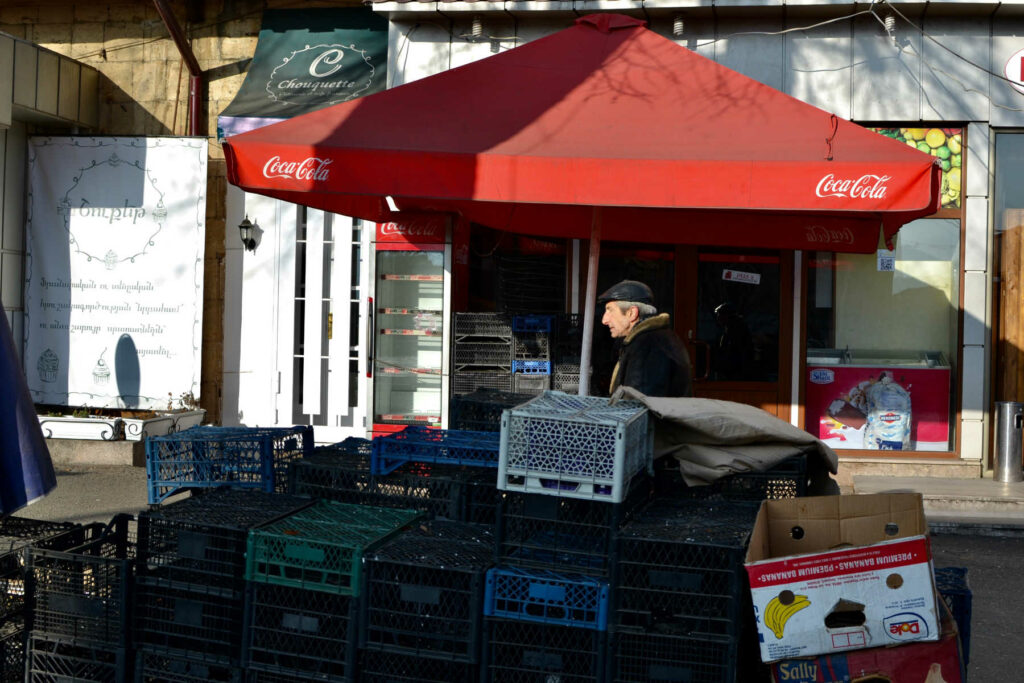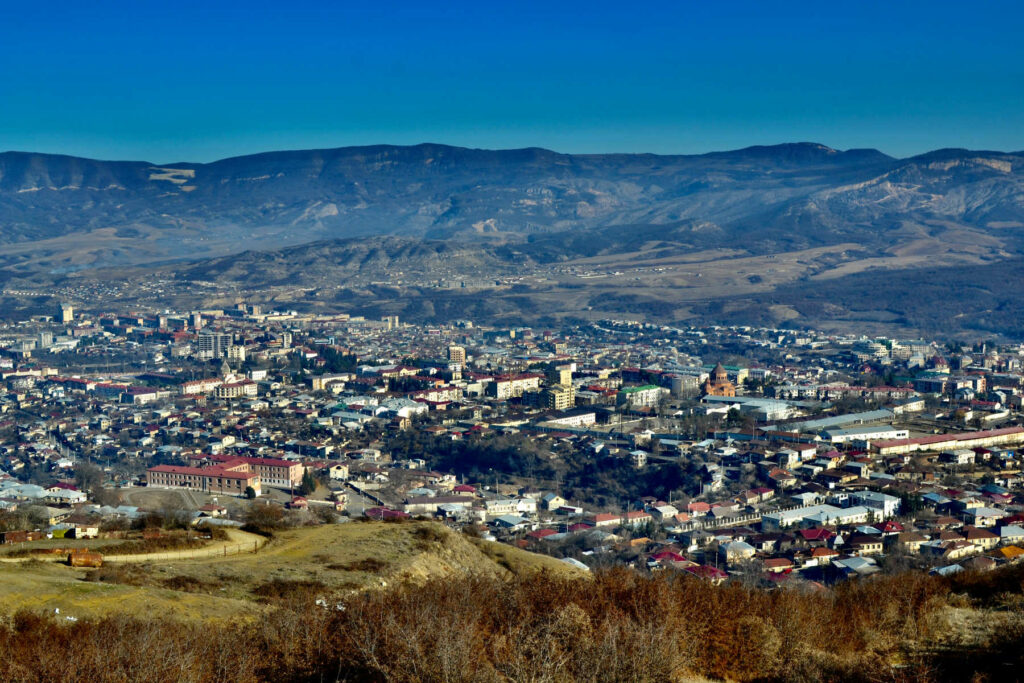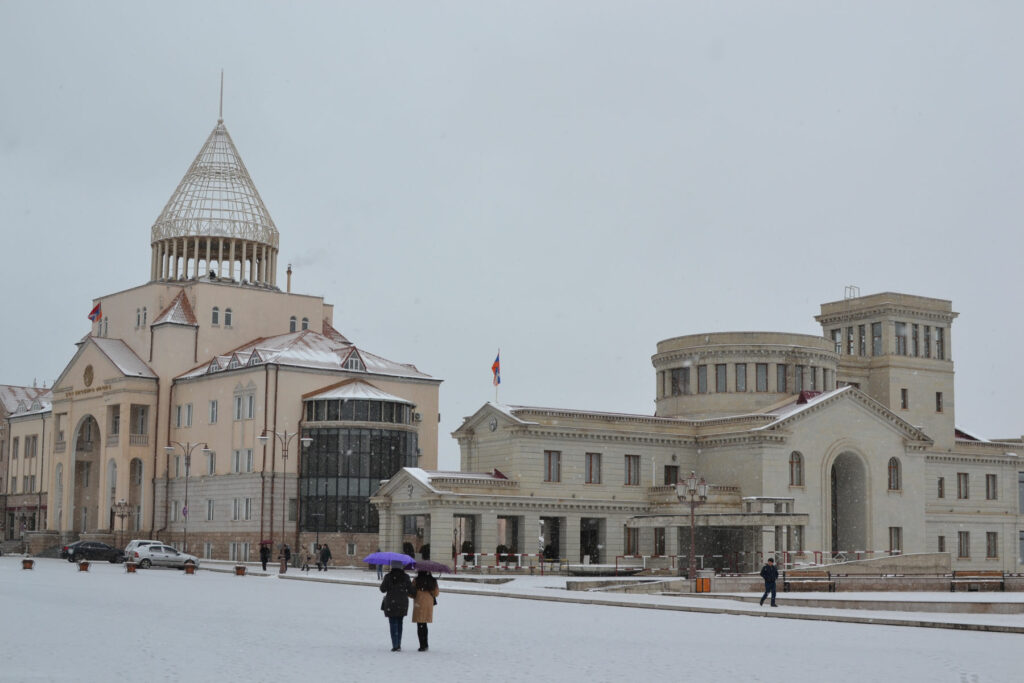Lillian Avedian is a writer and assistant editor at The Armenian Weekly. She is a former editorial intern at Democracy in Exile.
In Nagorno-Karabakh, life for the past two months has recalled memories of the collapse of the Soviet Union. Locals crowd storefronts for hours hoping to find eggs or laundry detergent. They receive limited quantities of food using government-issued coupons. Amid freezing temperatures, they heat their homes using wood-burning stoves.
"Last time I saw this picture was in the '90s," freelance photographer Marut Vanyan told Democracy in Exile.
Vanyan lives in Stepanakert, the de facto capital of the disputed territory. In the early 1990s, Armenian forces fought a war for the independence of the region, which is majority-Armenian inhabited and was part of Azerbaijan during the Soviet era. Nagorno-Karabakh, which is called Artsakh by Armenians, has been ruled by de facto Armenian authorities for the past three decades. During a six-week war in the fall of 2020, Azerbaijan, with military support from Turkey, captured about a third of Nagorno-Karabakh, as well as seven outlying districts it lost during the previous war.
Armenia and Azerbaijan have been locked in negotiations regarding the status of Nagorno-Karabakh for the past two years. Despite talks, Azerbaijan has launched several rounds of military aggression against Armenia and Nagorno-Karabakh, including a two-day war within Armenia's borders in September 2022, the bloodiest armed conflict since the 2020 war.
Since Dec. 12, 2022, Azerbaijani protesters sponsored by the government have blocked the Lachin corridor, the sole route connecting Nagorno-Karabakh with Armenia and the rest of the world. The closure of the route has placed Nagorno-Karabakh under blockade. Food and medical supplies are dwindling, since imports from Armenia have been entirely cut off. Gas, electricity and internet connections have been periodically disrupted, leaving residents without heating, hot water or fuel for their vehicles. Hundreds of families have been separated, as people traveling to Armenia in December have been stranded along the road.
"People are asking, how long can we eat only buckwheat? We have children. They need vitamins. What about them?"
- Marut Vanyan, photographer in Stepanakert
Vanyan says all of the grocery stores near his home have been closed for weeks. Stepanakert's central marketplace, usually bustling with vendors selling fresh produce, is empty. The remaining grocery stores only have alcohol left on their shelves.
The Armenian authorities of Nagorno-Karabakh have launched a food rationing system to preserve the remaining food supply. Every family can purchase one kilogram of pasta, buckwheat, rice and sugar and one liter of cooking oil per month using government-issued coupons. Vanyan recently purchased half a kilogram of sugar and will receive his remaining ration in two weeks.
"People are asking, how long can we eat only buckwheat?" Vanyan said. "We have children. They need vitamins. What about them?"

Under a Russian-brokered cease-fire ending the 2020 war, about 2,000 Russian peacekeepers were deployed to Nagorno-Karabakh and the Lachin corridor. Armenian authorities have been critical of Russia's inability to reopen the corridor and fulfill its obligations under the cease-fire agreement. Armenian Prime Minister Nikol Pashinyan has called the Russian peacekeeping force a "silent witness to the depopulation of the Nagorno-Karabakh region."
Political scientist Tigran Grigoryan, who is based in Yerevan, says that Russia has not taken action to end the blockade in order to avoid spoiling its relations with Turkey and Azerbaijan. Turkey, which sold drones to Azerbaijan and transported hundreds of Syrian mercenaries to serve in Azerbaijan's military during the 2020 war, has supported its close ally—what the Turkish government calls its "little brother"—amid its ongoing blockade of Nagorno-Karabakh.

Russian dependence on Turkey has deepened as a result of the war in Ukraine, according to Grigoryan. Trade between Russia and Turkey, one of the major powers in the region that has not imposed sanctions against Russia, has increased. Imports of Russian coal and oil to Turkey have risen. Meanwhile, Turkey has been a hub for exporting Western-manufactured technology to Russia, evading Western trade restrictions.
Russia has also cultivated an important relationship with Azerbaijan. As part of Europe's bid to reduce its dependence on Russian gas following Russia's invasion of Ukraine, the European Union signed an energy agreement with Azerbaijan to double its gas flows to Europe within the next five years. While selling gas to Europe, Azerbaijan has increased its import of gas from Russia to satisfy domestic demand.
"It buys gas from Russia to substitute gas it's selling to Europe," Grigoryan said. "Russia is indirectly selling gas to Europe through Azerbaijan."
The Armenians of Nagorno-Karabakh seem resolved to live on their ancestral lands, despite the dire humanitarian conditions created by Azerbaijan.
- Lillian Avedian
Russia, Turkey and Azerbaijan also have a shared interest in opening new routes in the South Caucasus. Grigoryan says that one of Azerbaijan's aims in blockading Nagorno-Karabakh is to force Armenia to accept a corridor through its territory connecting Azerbaijan with Turkey, free of customs or passport controls. Armenian authorities have called such a corridor without an Armenian presence a "red line."
Russian officials have publicly stated that any road passing through Armenia must respect its national sovereignty. Yet Russia is keen to open the route to facilitate trade with Turkey.
"Turkey is a key trading partner for Russia," Grigoryan said. "Russia has serious problems in the Black Sea, because lots of companies have been reluctant to work with Russia because of the threat of sanctions."
While Armenia grows disgruntled with Russia's inaction, international pressure from the West on Azerbaijan has been intensifying. The United States and the European Union, along with prominent human rights organizations, have called on Azerbaijan to resume travel and transportation along the Lachin corridor. During a phone call with Azerbaijani President Ilham Aliyev in late January, U.S. Secretary of State Antony Blinken "underscored that the risk of a humanitarian crisis in the Lachin corridor undermined prospects for peace between Armenia and Azerbaijan."

Yet according to Grigoryan, the diplomatic pressure could be coming too late. Grigoryan says Azerbaijan's aim for the past two years has been to "take control of Nagorno-Karabakh" and force its Armenian population to evacuate. Armenian authorities have warned that Azerbaijan is trying to make life in Nagorno-Karabakh unbearable for its Armenian residents so that they will leave, leading to the ethnic cleansing of the territory. President Aliyev told reporters on Jan. 10 that the "road is open" for any Armenian residents who do not want to become citizens of Azerbaijan to "leave whenever they want."
"Lots of people in the West weren't taking those words seriously," Grigoryan said.
Yet the Armenians of Nagorno-Karabakh seem resolved to live on their ancestral lands, despite the dire humanitarian conditions created by Azerbaijan.
"People just want to live here," Vanyan said. "Our graves are here. Our churches are here. We lived here for thousands of years, and we want to live here thousands of years more."







